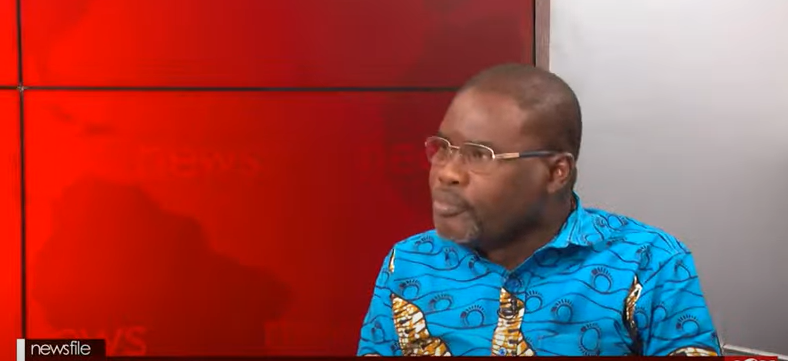Climate Change & Energy
GWCL risks shutdown due to turbidity of water processed – MD warns
Source: Citinewsroom.com - November 3, 2022

Top view of highly turbid Bonsa river: a water entering the sump of the water treatment plant of GWCL. Picture: Courtesy of A.O. Affum
Managing Director of the Ghana Water Company Limited (GWCL), Dr. Clifford Braimah is concerned about the future of the country’s water resources.
Speaking on Citi TV’s roundtable discussion on Galamsey, on Thursday, November 3, 2022, Dr. Braimah decried the extent of damage of the menace on the water company’s operations.
“It is not only our expenditure that is going high, the volume of water that we have to distribute is also getting limited, and so we are having so many problems. We can only manage and keep praying that Ghanaians will one day come to appreciate the extent of damage of the menace.”
“The cost is unbearable. We are resorting to more expensive chemicals to be able to reduce the process lost. The cost of treatment continues to go up.”
He was also concerned about the future of the country as the menace is affecting its capacity to produce water.
“We are not just living for today. There are so many years ahead of us, and we need to be mindful of that.”
He warned that the company will be forced to shut down its systems in the next 6 months if the situation is not addressed.

Dr. Clifford Braimah
“Our system is not made for wastewater, but for fresh water. If we do not take the issue of illegal mining seriously enough and address it, our systems may break down, and we may not be able to produce water for Ghanaians anymore.”
The Citi Galamsey Dialogue dubbed “Galamsey and Ghana’s Water Security” brought together stakeholders in the water sector to deliberate on the state of Ghana’s water resources and examine the effects of illegal mining on Ghana’s water security.
Other panellists were; Moses Abeiku Paintsil, the Eastern Regional Water Quality Assurance Manager of Ghana Water Company Limited (GWCL); Professor Chris Gordon, an Environmental Toxicologist; Dr. Bob Alfa, Director of Planning at the Water Resources Commission; and Dr. Adwoa Yirenkyi Fianko, a Senior Lecturer at the Ghana Institute of Management and Public Administration (GIMPA).
Ghana’s fight against illegal mining seems to have hit a snag after some initial successes following the Citi FM/Citi TV-led campaign in 2017.
The upsurge in activities of illegal miners poses threats on many levels to the country, among which national security and water security are the most prominent.
The pollution of water bodies, which provide the raw water for the production of potable water for the population, is particularly concerning as the threat seems to be escalating daily.
The Ghana Water Company Limited has lamented how its production cost has increased as a result of galamsey activities.
The water company has bemoaned how the life span of pumps does not last because the company is forced to replace them regularly. Management fears the country may import water for consumption if the activities persist.
The National Farmers and Fishermen Association has also decried of the devastating effect on Ghana’s cocoa industry.
Ghana already importing water
Meanwhile, the Director of Planning at the Water Resources Commission, Dr. Bob Alfa says Ghana is already importing water.
Speaking at the Citi TV’s Roundtable Discussion on Galamsey, Mr. Alfa said: “I hear people say all the time that if we don’t take time, we will soon import water. When we say Ghana is importing water, we often look at the physical importation but on the face of it, that is already happening. We are importing labour and tools into our water supply mechanisms.”
“Whatever we consume is produced with water and if you don’t develop your water resources, and then you import some country’s products, what you are importing is what they have done as far as their water development is concerned,” he explained.
He blamed the issue on the country’s lack of investment in its water resources.
“We do not even invest in our water resources, we do not manage our water resources very well.”
The Water Resources Commission (WRC) was established by an Act of Parliament (Act 522 of 1996) with the mandate to regulate and manage Ghana’s Water Resources and coordinate government policies in relation to them.
The Act stipulates that ownership and control of all water resources are vested in the President on behalf of the people, and clearly defines the WRC as the overall body responsible for water resources management in Ghana.
The Commission, which provides a forum for integration and collaboration of different interests, comprises the major stakeholders in the water sector.
 Dr. Clifford Braimah
Dr. Clifford Braimah
 Dr. Clifford Braimah
Dr. Clifford Braimah

 Top view of highly turbid Bonsa river: a water entering the sump of the water treatment plant of GWCL. Picture: Courtesy of A.O. Affum
Top view of highly turbid Bonsa river: a water entering the sump of the water treatment plant of GWCL. Picture: Courtesy of A.O. Affum
 Dr. Clifford Braimah
Dr. Clifford Braimah